Inflight Magazine of Brussels Airlines
Welcome to the Inflight Magazine of Brussels Airlines
Business trends
Text Boyd Farrow
Image Eyedea Press
Illustration Mat Bartlett
Our round-up of what’s happening in the business world across Europe
RADAR
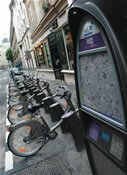 Ever increasing circles
Ever increasing circles
There will soon be more than 20,000 rental bikes in Paris, and 100,000 people already have annual subscriptions to the Cyclocity scheme. This has nothing to do with fitness fanatic Nicolas Sarkozy (or, indeed, the country’s recent industrial action) but the work of JCDecaux, the world’s second-biggest outdoor advertising company.
Last July, JCDecaux designed a heavy-duty bicycle, had thousands built in Hungary, and opened 750 rental stations in the French capital. It operates the network at its own expense and in return gets the exclusive rights to sell advertising on the city’s 1,628 urban billboards for the next 10 years. Customers pay a minimal basic fee to hire the bikes: €1 a day, €5 a week or just €29 for the whole year. Other European capitals offering JCDecaux rental bikes are Brussels, Vienna and Seville, while Geneva is in advanced negotiations and London and Moscow are interested.
Urban bike rental might just be the biggest transport story of the year: German state rail company Deutsche Bahn’s scheme, Call a Bike, now extends to Berlin, Frankfurt, Munich, Cologne, Stuttgart and Karlsruhe, and the US giant Clear Channel Outdoor has supplied Oslo, Stockholm and Barcelona with bikes.
Why are we here?
 Tax-free shopping
Tax-free shopping
Airport shopping is getting more and more aspirational. And if the just-ended Tax Free World Association (TWFA) annual love-in is anything to go by, things are going to get a whole lot more expensive. Fancy matching diamond-studded mother-and-daughter gold necklaces? Any takers for a pocket-size cigar humidor made out of crocodile leather for €5,835?
Business in the fast-growing number of duty free outlets in airports, cruise liners, ferries and shops is expected to keep growing, industry experts say, as the number of travellers worldwide rises. The buying surge should help the industry reach the $30bn mark this year, according to Erik Juul-Mortensen, TWFA’s president.
The anticipated biggie for 2008 is deluxe kids’ accessories. The Japanese brand Hello Kitty is launching a luxury range designed by France’s Victoria Couture, which includes diamond-studded gold kitty chokers costing up to €2,250.
The chairman of French company Kidow was quoted in the French press as saying: “Today’s business travellers want to buy more valuable presents to take home and this is promoting this new market.” His brand includes lacquered music boxes that play ‘It’s a Wonderful World’. It’s certainly a pricey one.
BUZZING ABOUT…
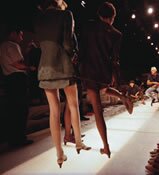 Armani
Armani
After decades of acting as coyly as a giant panda on a first date, Giorgio Armani has finally confirmed he’s open to a tie-up with an investor.
The iconic 73-year-old Italian designer mentioned his perennial stalker and perfume licensee L’Oréal as a possible partner, but said there were no talks at the moment. He also said he’d received an offer two years ago from Hamburg-based behemoth Beiersdorf, whose cosmetic brands include Nivea and La Prairie. Armani’s empire is conservatively valued at €4bn (or three tubs of La Prairie face-firming cream).
Armani, in Tokyo to unveil his new eponymous tower in the Ginza district shortly before Christmas, also used the occasion to slam ‘exploitative’ private equity funds, which have been gobbling up fashion companies. “If in the future there is say a fashion lover, a super-billionaire, who would like to join me to show off a bit as a bringer of money but also security, why not?” Armani said. Armani’s tower has the world’s first Armani spa, a collaboration with L’Oréal.
Speculation over the future of Armani has intensified since private equity firms dived headfirst into the luxury sector, intoxicated by rising incomes and emerging markets such as China and the Middle East. To finance such expansion, Italian family-owned labels such as Prada and Versace have had to open up to investors through listings or selling chunks of stock.
“These funds borrow money from banks, they merge two companies and then they go on the stock market to get back their money immediately, leaving the organisation adrift,” said Armani. “It’s an exploitation of the work of so many years – 35 years of work – I wouldn’t want to see all that ground away only so whoever gains from it, gains from it.”
Upgrade your trip
 Ahead in the clouds
Ahead in the clouds
Racking up 200,000 air miles or so a year, Peter Shankman was well aware of how boring and lonely business travel can be. So in 2002 he founded AirTroductions to offer travellers a way to share information about themselves and their flight itineraries before arriving at the airport. The aim was to connect like-minded business people who wanted to use their flight time for productive networking.
In December the service, which now has 30,000-plus members, was relaunched as TripLife (triplife.com), an expanded and more integrated service. Like Facebook in the sky, it allows users to see which of their fellow Triplife members are on a flight. “I think we’re going to see more of this kind of business social networking,” says Shankman. “We have to travel, so you may as well make the most of it.”
He says the basics still apply though. “Brush your teeth, comb your hair, put on a clean, nice pair of jeans and leave the sweatpants at home,” he says. It’s also a good idea to tone down the cologne. “Those seats are really close.” Shankman says he got the idea for the service when he was seated on a flight next to Miss Texas.
Not really…
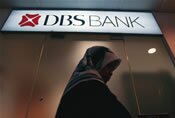 Islamic
Islamic
The $1.5 trillion of funds sloshing around the Middle East has propelled Islamic banking into the financial mainstream. Consequently major financial institutions and hubs, such as London, Frankfurt and Tokyo, have been making huge strides into the Islamic banking business.
As well as Islamic loans, there’s an increasing array of bonds (sukuks), credit cards and derivatives on offer, all adhering to sharia law and its ban on interest charges. Sharia-compliant loans or bonds are already available in the US, UK, Italy, Turkey, Switzerland, Luxembourg, Germany and France. In Islamic banking, financiers are required to share borrowers’ risks, meaning depositors are treated more like shareholders and earn a slice of profits.
In the light of worldwide interest rate woes, many financial observers predict several other countries will soon resemble Malaysia – a predominantly Muslim but secular nation – where non-Muslims routinely take advantage of Islamic products because of their competitive returns. In other words, anyone in Europe might soon lease a car or buy a holiday home, sharia-style. And as sharia-compliant financial mechanisms can’t receive or provide funds for anything involving alcohol, gambling, pornography or tobacco, they might also engage the growing band of socially conscious investors, Muslim and non-Muslim alike.
DRAWING BOARD
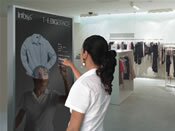 Reflecting profits
Reflecting profits
When you’re heading to the January sales you might not be alone in the changing room for much longer. A new high-tech mirror can identify which item on clothing you’re trying on, display product information and suggest coordinating items. Oh, and buttons on the touch-sensitive glass allow you to another size from sales assistants.
The mirror was developed by Milan company thebigspace in collaboration with Indian tech giant Infosys. It hides a computer, LCD screen, radio-frequency identification reader and antenna and is activated by transponders embedded in clothing tags. Although helpful to customers, it will be of far more value to retailers, who are competing against increasingly interactive online shopping. Retailers may reap more powerful benefits, too, aside from upselling to customers. The mirror ‘remembers’ what clothes customers try on to analyse what’s selling and it can alert staff to potential shoplifters.
Infosys is targeting US footwear and clothing manufacturers, before moving on to Europe and Asia. It’s focusing on the lower high-end and higher middle-market retailers who want to expand customer service but not their payrolls.
SHORT CUTS
 Calm offensive
Calm offensive
Apparently, some executives who can’t control their anger in the workplace fear that seeing a therapist or attending a counselling group would damage their reputation. Now help is at hand in the form of online anger management classes.
“Employers need an effective, affordable and efficient way to train employees without having to massive time away from work,” says Dr Ari Novick, founder of the AJ Novick Group (angerclassonline.com). “We’ve created an online anger management class specifically for employees, which can be monitored by the employer or company representative to ensure successful completion.”
Classes are timed and employees are required to pass a short test before they can move to the next lesson. Once they’ve finished the course, a Certificate of Completion is mailed to the employer. Cruelly, if the participant’s computer crashes during a class there’s no way of knowing whether it’s part of the test.
GROWING GAINS
 Feet and inches
Feet and inches
This is a tense month for UK conglomerate SSL, as it discovers whether Christmas and New Year sales rose to expectations and the countdown begins in earnest for its other crunch date, St Valentine’s Day. SSL owns the 103-year-old Scholl footcare and sandals brand, but its biggest money-spinner is condoms. SSL owns Durex, which has 35% of the global market for branded condoms.
This year, SSL is counting on customers being more adventurous. The strategy of chief executive Garry Watts has been to reposition Durex from being solely a brand of condoms that offer safe sex and turn it into “sexual wellbeing brand, offering consumers the promise of better sex”. Astonishingly, the two-year-old Durex Play brand already accounts for 20% of Durex’s turnover. The “intimate lubricants” are now available in pharmacies throughout Europe and have been a big hit, particularly with Spanish shoppers.
Traffic report
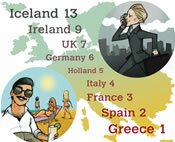 Naked ambition
Naked ambition
Only 1.7% of almost 700,000 start-ups in 53 countries plan to employ more than 100 people within the next five years, according to a Global Entrepreneurship Monitor report into ‘high-expectation entrepreneurship’ (HEE). Both high-expectation and established entrepreneurial activity is more widespread in northern Europe than southern Europe.
Europe’s biggest get-up-and-goer is Iceland, with 13 in every 1,000 adults involved in startups, followed by Ireland (nine in 1,000), UK (seven), Germany (six) and Holland (five).
Italy (four in 1,000), France (three) and Spain (two) are among the least ambitious. Greece (one in 1,000) has the lowest proportion of HEE adults and start-ups worldwide.
“While northern Europe’s technology base provides good opportunities for entrepreneurs with high-growth ambitions, southern Europe has a heritage of small family businesses, which tend to be less ambitious,” says Professor Erkko Autio, the report’s author. Southern Europe also has more sunshine and babe-packed beaches, the economic genius could have added.
Leave a Reply
